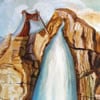Joel Cohen's Question:
For reasons that lack pristine clarity, G‑d became so angry at Moses for hitting the rock rather than talking to it that He said, "Because you did not believe in Me to sanctify Me before the eyes of the Children of Israel, therefore you will not bring this congregation to the Land that I have given them" (Numbers 20:12-13). Nothing there about the Israelites being responsible for Moses' plight in this regard—that is, at least, when G‑d tells the story.
But when Moses, in monologue, summarizes the Israelites' journey through the desert as his life is quickly drawing to an end, he describes the pivotal event tersely – and quite differently. Twice, in Deuteronomy (1:37 and 3:26) – indeed, using alternative synonyms – Moses tells the Israelites, that "G‑d got angry at me because of you" and refused to hear Moses' plea that he be allowed to cross the Jordan. So in Moses' recounting of the event representing this turning point moment in his life, as death loomed closely for him as he well knew, the Israelites were at fault, not he. Now, isn't that surprising?
Are the two accounts reconcilable without psychologizing the moment? Is this simply the case of a man, even perhaps the greatest man in the history of the world, becoming vulnerable – indeed, unalterably human – when his mortality is upon him?
And how should we read the Book of Deuteronomy particularly given how this episode is reported? Is the book, at bottom and in many respects (given that it repeats many core events previously discussed), an autobiographical summary of Moses' stewardship of the Israelites in the desert – a book which understandably, unlike the earlier books, contains the "subjective" views of its principal human protagonist? Stated more poignantly, is Deuteronomy simply a human's writing ("The One Book of Moses")?
Rabbi Adam Mintz Responds:
Joel, your question is a very poignant one this week. Is Moses really blaming the people for his sin of hitting the rock and the punishment preventing him from entering the land?
This question can be placed in a slightly different perspective by looking at the first verse you reference (though don't quote). There, Moses recounts the sin of the spies for which the generation that left Egypt was punished and was not allowed to enter the land. At the conclusion of that recounting, Moses says, "And G‑d got angry at me as well on your account." What does the sin of the spies have to do with Moses' sin of hitting the rock, a sin that took place 38 years after the episode of the spies?
Rabbi Amnon Bazak, a teacher at Yeshivat Har Etzion in Israel who writes a weekly column that is distributed in synagogues throughout Israel, makes the following suggestion. He argues that the sin of the spies did not really have anything to do with the sin of hitting of the rock. Yet, upon seeing that the people lacked faith in G d and did not believe that He could lead them into the land, Moses recognized that he would not complete his mission to imbue them with faith, this would be accomplished by his successors. He may not have known what would be the final cause of his demise, but he understood that he would not lead them in to the land.
Now, to answer your question: This explanation definitely introduces a human perspective into the story. That is what is unique about the book of Deuteronomy. It tells the same stories that we have read in the past but it introduces Moses' perspective. How much more do we appreciate Moses as our greatest leader when we see him not only as a participant in history but also as someone who understood and appreciated the events that he was living through.
Rabbi Eli Popack Responds:
Joel, your question reminds us that we need to put everything in context; it is always a matter of perspective. Amongst the diverse answers to your question suggested by the biblical commentaries, I found the following:
Indeed, the classic commentators explain why the nation was ultimately at fault for contributing towards and even bringing about Moses' mistake. But this statement was not an effort on Moses' part to pass the blame, as you suggest. Rather, Moses was the penultimate leader and teacher of the Jewish people. As such, when he embarked on his final good-bye speech he was certainly within character. When Moses says to the Jewish people, "It is because of you that I was punished," he is making a point: "Remember, children of Israel, that your every action has a reaction and the fact that you behaved in a certain way has impacted me, your leader, as well."
As a true leader Moses wanted the Jewish people to learn a valuable lesson at every juncture. Here his lesson was that as individuals and a group our actions can impact others and we need to be careful to ensure the integrity of every one of our actions.
The Midrash also explains this event from another perspective:
The literal translation of the verse is: "Also with me was G‑d angry for your sakes, saying: 'You, too, shall not enter [the Land].'"
G‑d said to Moses: "How do you request to enter the Land?
"...Your greatness is that you have taken the 600,000 out of bondage. But you have buried them in the desert and will bring into the land a different generation! This being so, people will think that the generation of the desert has no share in the World to Come! No, better be beside them, and you shall in the time to come enter with them."
The view of the Midrash again focuses on Moses' role as the leader. Moses reminds the Jewish people that G‑d has kept him with his flock for their benefit.





